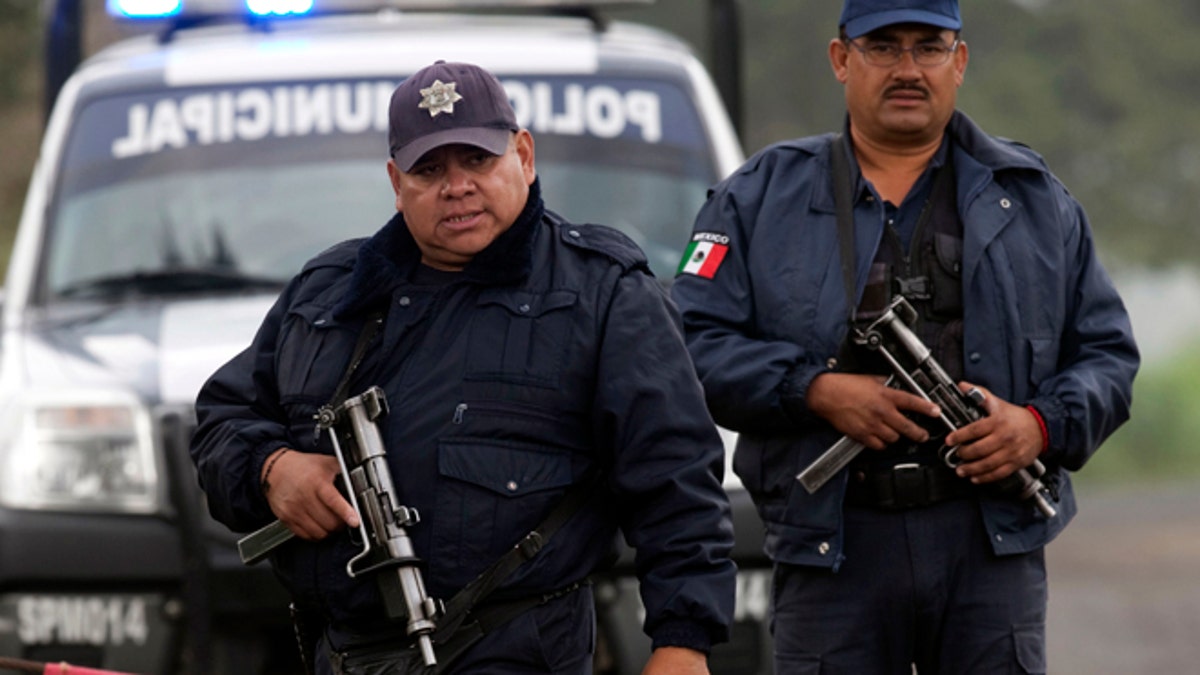
Aug 22, 2013: Municipal police guard the entrance to Rancho La Mesa where a mass grave was found in the municipality of Tlalmanalco, Mexico. (AP)
TLALMANALCO, Mexico – Mexican authorities said Thursday they have found a mass grave east of Mexico City and are testing to determine if it holds some of the 12 people who vanished from a bar in an upscale area of the capital nearly three months ago.
At least seven corpses had been recovered from the grave in Tlalmanalco, Mexico City prosecutor Rodolfo Rios told reporters at a news conference. He said the victims could not be identified from clothing, and the cause of death had not been determined.
"We will look at DNA tests that have been taken ... to confirm or discard scientifically if the bodies found are the people who disappeared from the bar," Rios said.
The federal Attorney General's Office said agents had received information about possible illegal weapons on the property known locally as Rancho La Negra, and obtained a search warrant. When they started looking around, they discovered the grave, Renato Sales Heredia, an assistant attorney general, told reporters.
"They found a home that looked like a safe house," Attorney General Jesus Murillo Karam told reporters. "We were operating under the belief it was a weapons case."
The young bar-goers vanished from the after-hours Heaven club at midday May 26, just a block from Mexico City's leafy Paseo de Reforma, the capital's equivalent of the Champs-Elysees. Some of theit relatives showed up on the property being excavated, crying and covering their faces from the media.
"We have had three months with this anxiety," Maria Teresa Ramos, grandmother of Jerzy Ortiz, one of the missing, told Milenio teleivsion. "We are dying every day, little by little."
Rios said there were more bodies and the work would continue in an area near Rancho La Mesa Ecological Park in the state of Mexico. He said the excavation was difficult because of terrain and rainy weather that has made the ground muddy. Authorities kept more than a mile perimeter around the excavation site on a hilly ranch, where federal police and attorney general's trucks and large white vans could be seen.
One federal investigator at the scene said searchers were "90 percent sure" that the bodies belonged to the victims in the Heaven case because of the designer clothes found. None had identification, and excavators couldn't see tattoos or other distinguishing marks because the bodies were so decomposed, said the agent, who agreed to discuss the case only if he was not quoted by name because he wasn't authorized to speak to the press.
He said the seven bodies discovered so far were covered in lime and sand in a shallow grave. He said searchers were still digging.
Though Murillo Karam said there were no arrests, the agent said two men living in a trailer on the property were detained and three guns were found.
The land is private property, said a worker on a neighboring property who would not allow his name to be used. The ranch is walled and surrounded by oak and pine trees. Bulldozers could be heard off in the distance, as well as cows, rooster and other animals. The worker said it cannot be accessed by the public.
Prosecutors have said the abductions from the bar were linked to a dispute between two rival drug gangs, one in Mexico City's dangerous Tepito neighborhood, home to most of the abducted. The families of the disappeared, however, say the missing young people were not involved in drug trafficking.
Surveillance cameras showed several cars pulling up to the bar and taking the victims away. A witness who escaped told authorities that a bar manager had ordered the music turned off, told patrons that authorities were about to raid the establishment and ordered those inside to leave.
The 12 have not been heard from since.
So far, five people have been detained in the Heaven case, including club owner Ernesto Espinosa Lobo, known as "The Wolf," who has been charged with kidnapping. Among the arrested are another bar owner, a driver and security guard.
One suspect is still a fugitive.
The bizarre disappearance resonated across the city of 9 million people because many had come to believe it was an oasis from Mexico's cartels and drug violence.
The mass abduction of 12 mirrored crimes in drug-trafficking hot spots such as the western state of Michoacan, where 21 tourists disappeared, only to be found in a mass grave, or in Monterrey, where 17 kidnapped musicians were found dead at the bottom of a well.
Mexico City officials have insisted since the Heaven kidnapping that large drug cartels do not operate in the city. But the case has been a political liability, with local polls saying the public is overwhelmingly opposed to how Mayor Miguel Mancera has handled the case.
In another element of the case that is reminiscent of cartel warfare, one of the owners of the Heaven bar, Dax Rodriguez Ledezma, fled authorities only to turn up dead, his body dumped and burned in a rural area with that of his girlfriend and another friend.
